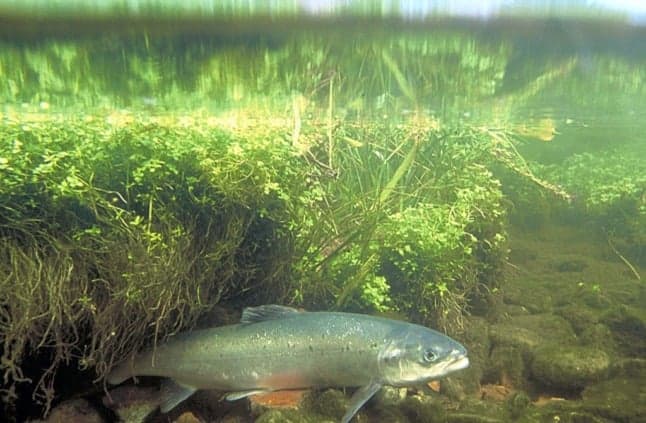Atlantic salmon added to Norwegian list of threatened animals

The Atlantic salmon, synonymous with Norway, has been added to a list of species that are endangered or threatened by extinction.
The wild Atlantic salmon has been added to the 'red list', a database of threatened, endangered and extinct species in Norway, for the first time after its population halved over the past 40 years.
The fish, an icon of Norway depicted on petroglyphs and featured heavily in Norse mythology, has been classified as “near threatened” on the red list, which is complied by the Species Data Bank, due to declining stocks.
“The main reason the species is on the red list is that we have seen a decline,” Snorre Henriksen, senior advisor at the Species Data Bank, explained to public broadcaster NRK.
Lice and diseases spread by escaped farmed salmon are considered the biggest reason for declining salmon stocks in Norway, according to the species monitor.
“Infections related to salmon farming are also a significant threat,” the Species Data Bank also wrote in its database entry on Atlantic salmon.
Between 1983 and 2019, the number of adult salmon returning from sea to spawning pools decreased by 51 percent.
Another animal that conjures images of the Nordics, reindeer, is also set to be added to the red list. Encroachment onto reindeer habitats is seen as the factor affecting the species the most.
READ ALSO: Norwegian salmon farming moves to cleaner indoor waters
Henriksen said that the Species Data Bank has noticed climate change was beginning to threaten many species.
“The big change is that many species are threatened by climate change. So it is a rather dramatic change since the last time (the list was updated),” the advisor said.
In total, 333 species were added to the list, and 309 were removed. There are 2,752 species on the list, which has been updated for the first time since 2015.
Comments
See Also
The wild Atlantic salmon has been added to the 'red list', a database of threatened, endangered and extinct species in Norway, for the first time after its population halved over the past 40 years.
The fish, an icon of Norway depicted on petroglyphs and featured heavily in Norse mythology, has been classified as “near threatened” on the red list, which is complied by the Species Data Bank, due to declining stocks.
“The main reason the species is on the red list is that we have seen a decline,” Snorre Henriksen, senior advisor at the Species Data Bank, explained to public broadcaster NRK.
Lice and diseases spread by escaped farmed salmon are considered the biggest reason for declining salmon stocks in Norway, according to the species monitor.
“Infections related to salmon farming are also a significant threat,” the Species Data Bank also wrote in its database entry on Atlantic salmon.
Between 1983 and 2019, the number of adult salmon returning from sea to spawning pools decreased by 51 percent.
Another animal that conjures images of the Nordics, reindeer, is also set to be added to the red list. Encroachment onto reindeer habitats is seen as the factor affecting the species the most.
READ ALSO: Norwegian salmon farming moves to cleaner indoor waters
Henriksen said that the Species Data Bank has noticed climate change was beginning to threaten many species.
“The big change is that many species are threatened by climate change. So it is a rather dramatic change since the last time (the list was updated),” the advisor said.
In total, 333 species were added to the list, and 309 were removed. There are 2,752 species on the list, which has been updated for the first time since 2015.
Join the conversation in our comments section below. Share your own views and experience and if you have a question or suggestion for our journalists then email us at [email protected].
Please keep comments civil, constructive and on topic – and make sure to read our terms of use before getting involved.
Please log in here to leave a comment.